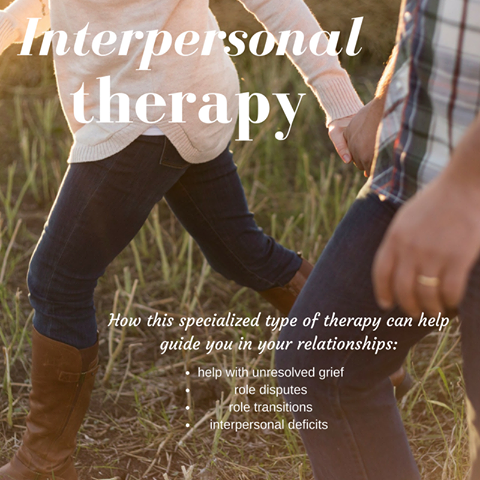
Interpersonal Therapy
In the process of recovery, it helps to get to know the many avenues of therapy that can provide you with the right tools to succeed. For this month’s blog posts, I will discuss five different types of therapy commonly used to accomplish this: interpersonal therapy, art therapy, dialectical behavior therapy, family therapy, and cognitive behavioral therapy.
Interpersonal therapy is primarily designed to guide you through your relationships. This is a common form of therapy as it mostly teaches you how to identify your emotions, express them healthily, and use the new knowledge to improve future situations. Although it may have some parallels to psychoanalysis, it is quite different in that it exclusively focuses on current relationships and not on past relationships or deep-seated reasons for current feelings. Additionally, while psychotherapy does not tend to have a timeframe of completion, interpersonal therapy does, which your therapist will determine.
This type of therapy was designed for four different reasons for depression: Unresolved grief, role disputes, role transitions, and interpersonal deficits. However, it is now being adapted to improve other mental health situations such as bipolar disorder, drug abuse disorder, and borderline personality disorder.
Unresolved grief incorporates any behavior that may not be what is considered typical when someone is in bereavement. The person may be grieving for longer than just a few months, they may do abnormal things or show no emotions at all. For this, interpersonal therapy will help the person identify what emotions they are feeling. For example, the grieving person may be acting out angrily at work. During interpersonal therapy, the therapist would help them identify that anger is just an expressed emotion used to cover up some other emotion like sadness or fear.
Role Disputes usually involves marital relationships, but may also involve co-workers or other types of relationships where certain boundaries may not be clearly stated. One way that interpersonal therapy may help is by teaching the person how to effectively communicate their feelings with their spouse or co-worker. With proper communication, the right kind of dialog can open up a more suitable conversation, which will progress the relationship rather than threaten it.
Role Transitions are when a person is undergoing an often normal and necessary life transition. This may be leaving home to start school or work, getting married, or having children. In each of these situations, the person is transitioning from role to new role in their lives and may feel anxiety or depression due to their difficult in feeling confident in their ability. Interpersonal therapy would help this person identify potential fears and anxieties and help them gain confidence.
Interpersonal deficits focuses on problems with developing and maintaining healthy relationships. With this, a therapist may help the person identify how they can seek out and maintain a relationship with someone who would nourish the relationship, rather than causing more problems. Some people who are suffering from depression will take on relationship challenges in desperation but soon find that they are not capable of solving the problems they face.
If you live in the Portland, OR or Vancouver, WA area and are struggling with substance use and/or a mental health condition, we want to help you. We offer substance use residential treatment that heals the entire person, including teaching you how to improve your personal relationships. We provide you with a one-on-one recovery coach who can develop a plan that takes you on a path to recovery. Please call or email us with any questions you may have:
Phone: 360-397-8246 ext. 7580
Email: admission_office@lifelineconnections.org
